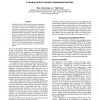Free Online Productivity Tools
i2Speak
i2Symbol
i2OCR
iTex2Img
iWeb2Print
iWeb2Shot
i2Type
iPdf2Split
iPdf2Merge
i2Bopomofo
i2Arabic
i2Style
i2Image
i2PDF
iLatex2Rtf
Sci2ools
121
click to vote
FLAIRS
2008
2008
Learning in the Lexical-Grammatical Interface
Children are facile at both discovering word boundaries and using those words to build higher-level structures in tandem. Current research treats lexical acquisition and grammar induction as two distinct tasks. Doing so has led to unreasonable assumptions. Existing work in grammar induction presupposes a perfectly segmented, noise-free lexicon, while lexical learning approaches largely ignore how the lexicon is used. This paper combines both tasks in a novel framework for bootstrapping lexical acquisition and grammar induction. We present an algorithm that iteratively learns a lexicon and a grammar for a class of regular languages in polynomial time, and we report experimental results for benchmark languages. The ease with which children learn to discover boundaries in their environments while building grounded high-level structures belies the complexity and computational challenges of the task. We address these two disparate problems by proposing a bootstrap between lexical and gramm...
Related Content
| Added | 02 Oct 2010 |
| Updated | 02 Oct 2010 |
| Type | Conference |
| Year | 2008 |
| Where | FLAIRS |
| Authors | Tom Armstrong, Tim Oates |
Comments (0)

